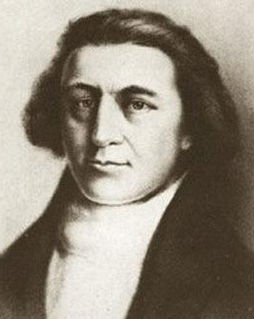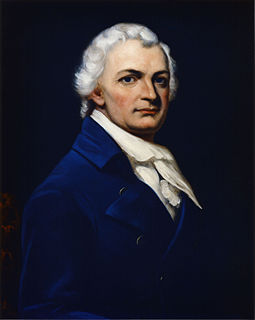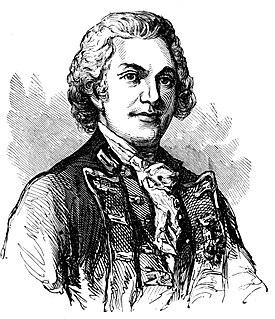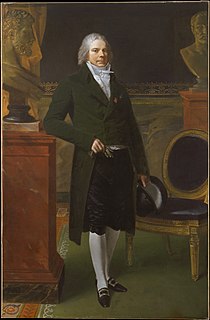 W
WJohn Adams was an American statesman, attorney, diplomat, writer, and Founding Father who served as the second president of the United States, from 1797 to 1801. Before his presidency, he was a leader of the American Revolution that achieved independence from Great Britain, and he served as the first vice president of the United States. Adams was a dedicated diarist and regularly corresponded with many important figures in early American history, including his wife and adviser Abigail Adams and Thomas Jefferson.
 W
WEdme Étienne Borne Desfourneaux was a French Army General and Governor of Guadalope.
 W
WCaptain Gamaliel Bradford, was a sea captain, privateersman, and later a prison warden who earned notoriety during the Quasi-War with France commanding two privately owned and armed merchant vessels known as letters of marque. Born November 4, 1763 in Duxbury, Massachusetts, he served in the 14th Massachusetts Regiment at a young age during the American Revolution, initially as a private and eventually was commissioned a lieutenant in the Continental Army. At the end of the war he went to sea as a mariner and by the 1790s commanded merchant vessels as a master mariner.
 W
WGustavus Conyngham was an Irish-born American merchant sea captain, an officer in the Continental Navy and a privateer. As a commissioned captain fighting the British in the American Revolutionary War, he captured 24 ships in the eastern Atlantic between May 1777 and May 1778, bringing the expenses associated with British shipping to a then all-time high. He has been called "the most successful of all Continental Navy captains".
 W
WStephen Decatur Jr. was a United States naval officer and commodore. He was born on the eastern shore of Maryland in Worcester County, the son of a U.S. naval officer who served during the American Revolution. His father, Stephen Decatur Sr., was a commodore in the U.S. Navy, and brought the younger Stephen into the world of ships and sailing early on. Shortly after attending college, Decatur followed in his father's footsteps and joined the U.S. Navy at the age of nineteen as a midshipman.
 W
WElbridge Thomas Gerry was an American politician and diplomat. As a Democratic-Republican he served as the fifth vice president of the United States under President James Madison from March 1813 until his death in November 1814. The political practice of gerrymandering is named after him.
 W
WRobert Gray was an American merchant sea captain who is known for his achievements in connection with two trading voyages to the northern Pacific coast of North America, between 1790 and 1793, which pioneered the American maritime fur trade in that region. In the course of those voyages, Gray explored portions of that coast and, in 1790, completed the first American circumnavigation of the world. He was noted for coming upon and naming the Columbia River in 1792, while on his second voyage.
 W
WJohn Marshall was an American politician and lawyer who served as the fourth Chief Justice of the United States from 1801 to 1835. Marshall remains the longest-serving chief justice and fourth-longest serving justice in Supreme Court history, and he is widely regarded as one of the most influential justices to ever sit on the Supreme Court. Prior to joining the Supreme Court, Marshall served as the United States Secretary of State under President John Adams.
 W
WBenjamin Stoddert was the first United States Secretary of the Navy from May 1, 1798, to March 31, 1801.
 W
WNicolas Surcouf was a French privateer. He was the brother and lieutenant of one of France's most famous and successful privateers, Robert Surcouf. Nicholas was the second eldest of four brothers, and Robert the second youngest.
 W
WRobert Surcouf was a French privateer who operated in the Indian Ocean between 1789 and 1801, and again from 1807 to 1808, capturing over 40 prizes. He later amassed a large fortune as a ship-owner, from privateering, commerce, and illegal slave trade, and as a landowner.
 W
WSilas Talbot was an officer in the Continental Army and in the Continental Navy during the American Revolution. Talbot is most famous for commanding USS Constitution from 1799 to 1801.
 W
WCharles-Maurice de Talleyrand-Périgord, 1st Prince of Benevento, then Prince of Talleyrand, was a French clergyman and leading diplomat. After studying theology, he became Agent-General of the Clergy in 1780 and represented the Catholic Church to the French Crown. Just before the French Revolution, he became Bishop of Autun. He worked at the highest levels of successive French governments, most commonly as foreign minister or in some other diplomatic capacity. His career spanned the regimes of Louis XVI, the years of the French Revolution, Napoleon, Louis XVIII, and Louis-Philippe. Those Talleyrand served often distrusted him but, like Napoleon, found him extremely useful. The name "Talleyrand" has become a byword for crafty, cynical diplomacy.